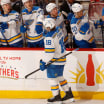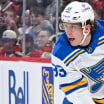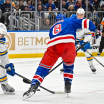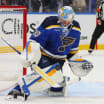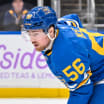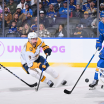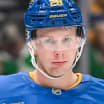ST. LOUIS - It's not easy being an enforcer in the National Hockey League these days.
According to hockeyfights.com, NHL players dropped the gloves a whopping 469 times during the 2013-14 regular season. In 2014-15, that number dropped to 391 and last year, it dwindled to just 344.
Reaves adapting his game for changing NHL
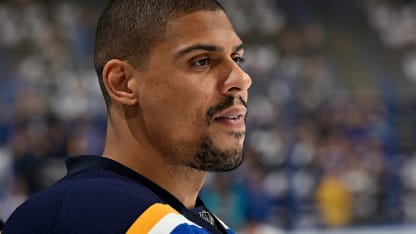
By
Chris Pinkert
St. Louis Blues
When you do the math, that's a 27 percent decline over a two-year period.
If you're Blues forward Ryan Reaves, who makes a living by dropping the gloves and being one of the NHL's biggest and baddest tough guys, those stats might raise an eyebrow or even be cause for concern.
"You can't just go up to someone anymore and ask them to fight and expect them to say yes," Reaves said. "That's just not part of the game anymore."
Reaves could see his own number of fights declining, too. He had 13 fights during the 2011-12 season and was down to just four last year.
Knowing he might need to change his role to stay relevant in a changing League, Reaves went to work this summer on becoming a more well-rounded player. Sure, he can still drop the gloves if necessary, but he needed to become a more effective player capable of holding his own in the skill side of the game.
The 29-year-old Winnipeg native spent less time boxing in the offseason and more time working on his explosiveness, often wearing a weighted vest while skating and sprinting. He returned to St. Louis on two occasions in the summer to work with Sean Ferrell, the Blues' Video and Skill Development Coach, doing one-on-one skating sessions that included skill work in the corners with plenty of in-tight movements.
"I think anytime your job is changing and you don't adjust, that's not a good career move," Reaves said. "You have to change with the times and if I want to stay in the League, stay on this team and stay in the lineup, I've got to change. That's just the way game is going now. There's a lot less fighting, a lot more skill, a lot more speed. That's what I have to do."
Blues Head Coach Ken Hitchcock agreed, saying "we looked at it from a career standpoint, and he had to change. He had to become quicker and have more endurance to become a good player. He had to address a lot of things, quite frankly… I think Reavo really took it to heart. I think when he came and worked with Sean and he saw improvement, that's when the buy-in started. When he came back the second time and skated and found out that he wasn't near as tired as he was the first time, he could see the benefit of what he was doing. The weight loss, the endurance game, the extra work cardio-wise, the extra agility training… he did a lot of good things."
You can see the hard work paying off. Reaves has had just one fight this year - Nov. 5 against Columbus' Nick Foligno - but has made two highlight-reel passes through traffic to set up linemates Scottie Upshall and Kyle Brodziak for goals.
Reaves may joke that he "blacked out" when he made the passes, but all jokes aside, it's clear his dedicated summer of training is now paying big dividends.
"I'm just a little more confident with the puck on the ice, and a lot more confident with the plays I want to make and the plays I can make," Reaves said. "Last year, I was a little more hesitant to make plays, which made me a step behind in everything I was doing. My linemates are helping me out a lot and playing really well right now. The chemistry is there and we're just building on that."
"I don't think (fighters) play anymore," Hitchcock added. "Regulators play, but fighters don't. Ryan is now a regulator. That's a big difference."


